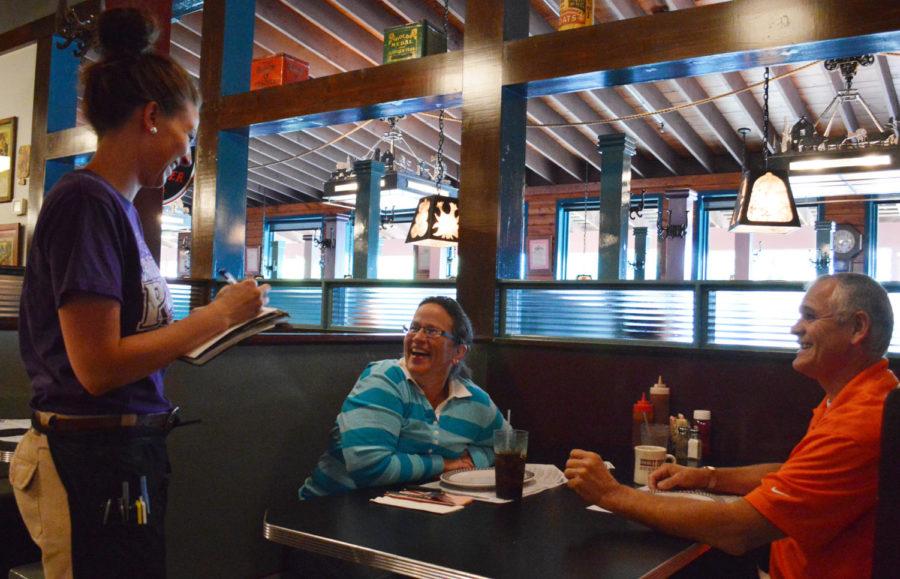Krueger: Restaurant etiquette: The simple stuff
Rhonda and Roger Reker enjoy their time at Hickory Park with their friendly server Breanna O’Tool on Wednesday, Oct. 9.
October 11, 2013
“Hello, welcome to our restaurant! Will anyone else be joining you today?”
You emerge from your comatose state long enough to mumble an answer. You’ve had the most stressful week of your life. Between classes, clubs and your part-time job, the muddled stress mixed with your limited time has nearly pushed you over the edge.
You look around and notice a couple of booths open in the back of the crowded restaurant; how good would it feel to spread out in one of those cozy booths during the rampage of pain that is your existence?
While in your state of oblivion, the restaurant hosts have found a spot for you to sit and direct you to a table with four chairs.
Obviously, you won’t stand for that. Never mind that the restaurant is buzzing with people or that the booth could seat a family of six — you need a booth next to a window.
At the end of your meal, you receive a $30 tab. You pull a smattering of quarters and pennies from your pocket and leave your remaining charity on the receipt.
Working as a restaurant employee, I see scenes such as this nearly every shift. I can understand the crazy college schedule, and I can admit to having bad days. However, it reflects poorly on you when you take your frazzled overload out on an employee. While a server’s job is to assist an individual during the course of their meal, it gives them no right to treat the server like a slave.
Here are some simple ways to make sure your restaurant experience is a decent one for both you and the employees:
Hosts
Hosts are the people that greet you at the door of the restaurant and figure out the best place to seat you at the time. Believe it or not, there is a method to their madness. Most restaurants have a rotation chart at the host stand. One of the hosts’ jobs is to seat each section in an orderly fashion. This is so one server will not be bombarded by four tables that need immediate assistance while another server has nothing to do.
If you know you want a booth, tell the hosts your preference before you are seated. I say this because I know how aggravating it can be to walk across the restaurant and only then to be told the guest’s inclination. If the restaurant is not too busy, chances are you will get a booth.
However, if the restaurant is busy, you have a few options. You can either wait for a booth to open up, accept the table that you will be seated at, or choose another restaurant.
At some restaurants, the hosts are expected to tell you the daily specials after they seat you. This only takes a half a minute at the most, so try not to embarrass the hosts by cutting them off, giving them your drink orders (which is not part of their job), or acting bored with the whole spiel.
Servers/bartenders
Servers and bartenders probably have one of the most difficult jobs in the restaurant. It can often be highly demanding and poorly rewarded.
Drinks come first — don’t be that person who takes a full 15 minutes to decide what kind you want. Decide quickly; you can always ask for something else later.
When a server has other tables to assist, chances are that they will give you more time to decide on your food order to go assist another table. Surprise: As soon as they walk away, you’ll probably have made your decision. Now you get to wait until the server helps the other tables before helping you.
Figure out what sides you need for your meal, and tell the server all of them in one or two trips. It can be extremely frustrating to the server if every time they go to check on a table, you flag them down and demand ranch dressing ASAP. You are not the only table in the restaurant; don’t expect to be treated as such.
Servers often make less than minimum wage, so if they did a good job and served you well, tip them well. Servers understand that most people don’t have an extra 20 bucks to tip them on a $30 tab. Common courtesy is to tip 15 percent. If you can’t afford that, you can’t afford your meal either. More affordable options that don’t require tips are out there, such as McDonald’s.
Ultimately, it comes down to a simple cliche: Treat others how you would want to be treated. Restaurant staff work hard to bring you service, not to be your servant. You never know: They might have mountains of homework to complete at the end of their shift, just like you do.
It might seem like simple stuff, but basic etiquette always is.

















